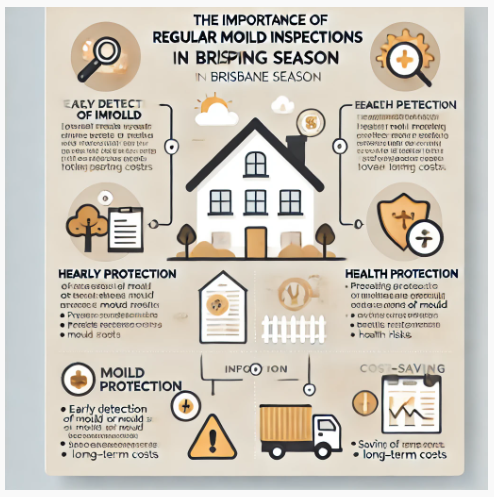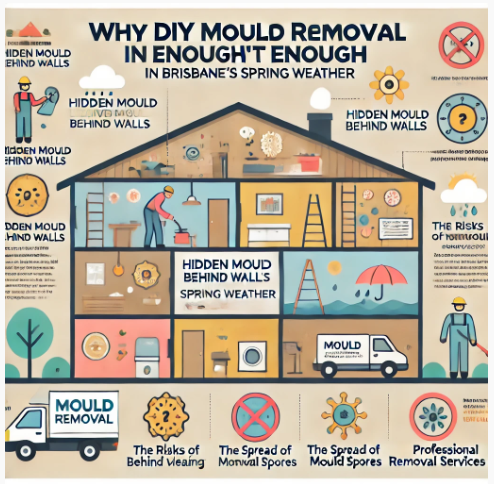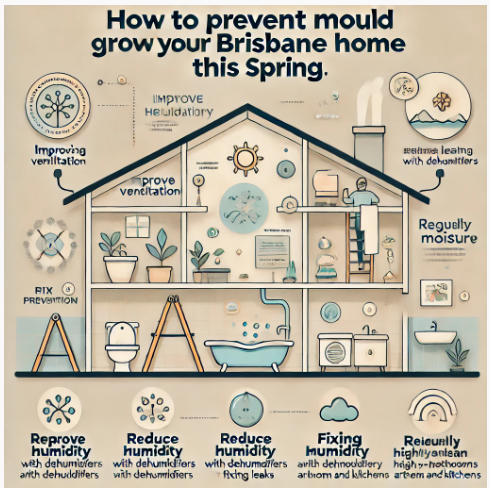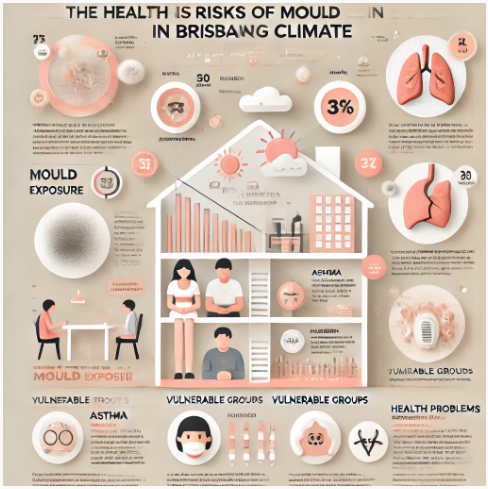Mould Removal Brisbane – When it comes to mould, Brisbane homeowners face a unique challenge. To effectively combat this pesky problem in the subtropical climate, understanding its formation and removal is key.
In this guide, we’ll uncover the essentials of mould removal, the science behind its growth, and why considering professional help like mould removal Brisbane is a smart choice.
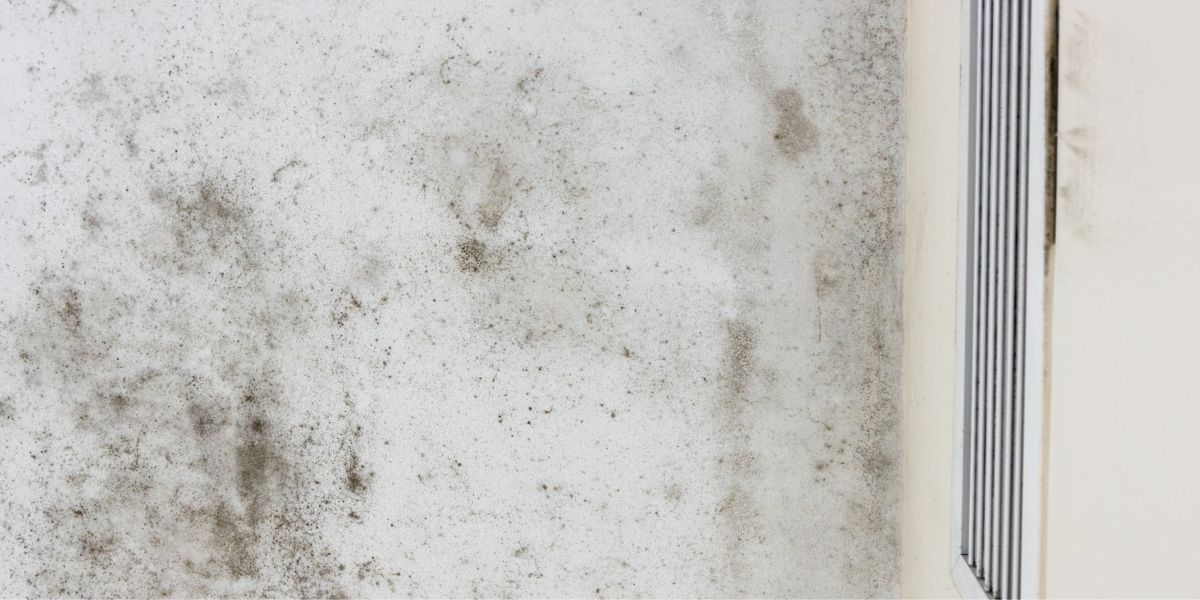
What Creates the Perfect Environment for Mould in Brisbane?
To fight mould, you must comprehend how it thrives. Mould is a type of fungus that naturally breaks down organic matter. When it infiltrates your home, it becomes a nuisance. Common household moulds include Aspergillus, Penicillium, and the notorious “black mould,” Stachybotrys chartarum.
Why Does Mould Thrive in High Humidity?
Mould requires specific conditions:
- Humidity: Mould thrives in humidity above 70%, making Brisbane’s subtropical climate an ideal breeding ground.
- Temperature: Mould prefers temperatures between 25°C and 30°C, common in Brisbane homes.
- Moisture: Mould needs moisture to thrive. Even a minor leak or condensation can provide sufficient moisture for growth.
How Does Mould Progress Through Its Life Cycle?
Mould has a life cycle:
- Spore Activation: Tiny mould spores are always in the air. When they encounter moisture, they activate and start growing.
- Growth: Activated mould produces mycelium, a network of thread-like structures that absorb nutrients from the surroundings.
- Reproduction: Mould reproduces by releasing spores into the air, easily spreading to colonise new surfaces.
- Colonisation: Mould can cover various surfaces, including walls, ceilings, and hidden spaces.
What Are the Health Implications of Mould Exposure?
Mould exposure can lead to health issues, especially for those sensitive to mould spores. Common problems include:
Respiratory Issues: Inhaling mould spores can cause coughing, wheezing, and throat irritation.
Allergic Reactions: Some individuals may experience sneezing, a runny nose, and skin rashes when exposed to mould.
Asthma Aggravation: For asthma sufferers, mould exposure can trigger or worsen symptoms.
Severe Health Risks: Prolonged exposure, particularly for those with weakened immune systems, can lead to more severe health problems.
What Fuels Mould Growth in Brisbane?
The Causes and Consequences of Mould Growth in Brisbane
Brisbane’s subtropical climate, with high humidity and frequent rainfall, creates an ideal environment for mould. Mould spores are always in the air, and when they land on damp surfaces, they swiftly grow into colonies. Key factors contributing to mould growth in Brisbane homes include:
How Does High Humidity Contribute to Mould Growth?
Mould thrives on humidity, making Brisbane’s poor-ventilation homes susceptible. The subtropical climate provides constant moisture, an ideal breeding ground for mould.
What Role Do Leaks and Water Damage Play in Mould Growth?
Brisbane’s frequent heavy rainfall can lead to roof leaks, plumbing issues, and floods, introducing excess moisture into homes. Swiftly addressing leaks is crucial in preventing mould growth.
How Does Poor Ventilation Impact Mould Growth?
Inadequate ventilation traps moisture indoors, promoting mould growth in bathrooms and kitchens. Maintaining proper ventilation is challenging due to Brisbane’s humidity, requiring extra preventive measures.
Why Opt for Professional Mould Removal Services in Brisbane?
The Importance of Professional Mould Removal Services
Mould is a challenge best left to the experts. Here’s why professional mould removal services are essential:
Why Is Expertise Essential in Mould Removal?
Mould removal Brisbane experts are trained to identify mould types and sources. Different mould types require specific removal methods, ensuring safe and effective removal.
How Does Professional Mould Removal Ensure Safety?
Mould removal can release spores and mycotoxins that harm health. Mould Professionals employ proper safety gear to minimise risks, ensuring a safe process for all.
Why Is Preventive Maintenance Important?
Preventive measures are crucial. Professionals address the root cause of mould growth, preventing its return by fixing leaks, improving ventilation, and recommending preventive actions.
A Quick Guide to Tackling Mould in Brisbane: What Causes It and How to Deal with It?
Mould Removal Brisbane – Brisbane homeowners often grapple with a persistent problem: mould. To effectively combat this issue, especially in the unique subtropical climate of Brisbane, it’s crucial to understand what causes mould and how to get rid of it.
Here, we’ll delve into the basics of mould removal, the science behind its growth, and why seeking professional assistance, like mould removal in Brisbane, is a wise choice.
What Makes Mould Thrive in Brisbane’s Climate?
To understand mould, it’s essential to know how and why it thrives. Mould is a type of fungus that naturally decomposes organic matter. However, when it infiltrates your home, it becomes a nuisance. Common moulds found in households include Aspergillus, Penicillium, and the infamous “black mould,” Stachybotrys chartarum.
Why Does Mould Thrive in High Humidity?
Mould requires specific conditions:
- Humidity: Mould thrives when humidity levels exceed 70%. In Brisbane’s subtropical climate, where humidity is abundant, this creates an ideal breeding ground for mould.
- Temperature: Mould prefers temperatures between 25°C and 30°C, common in Brisbane homes.
- Moisture: Mould needs moisture to thrive. Even a minor water leak or condensation can provide enough moisture for it to grow.
How Does Mould Progress Through Its Life Cycle?
Mould follows a life cycle with various stages:
- Spore Activation: Mould spores, which are tiny and always present in the air, become active when they encounter moisture. This activates their growth.
- Growth: Once activated, mould forms mycelium, a network of thread-like structures that absorb nutrients from their surroundings.
- Reproduction: Mould reproduces by releasing spores into the air, which can be carried by air currents, enabling the mould to spread and colonise new surfaces.
- Colonization: Mould can cover various surfaces, including walls, ceilings, and hidden spaces.
What Health Implications Does Mould Exposure Pose?
Mould exposure can lead to health issues, especially for those sensitive to mould spores. Common health problems include:
Respiratory Problems: Inhaling mould spores can lead to coughing, wheezing, and throat irritation.
Allergic Reactions: Some individuals may experience sneezing, a runny nose, and skin rashes when exposed to mould.
Asthma Exacerbation: For individuals with asthma, mould exposure can trigger or worsen asthma symptoms.
More Severe Health Risks: Extended exposure, particularly for those with weakened immune systems, can result in more serious health problems.
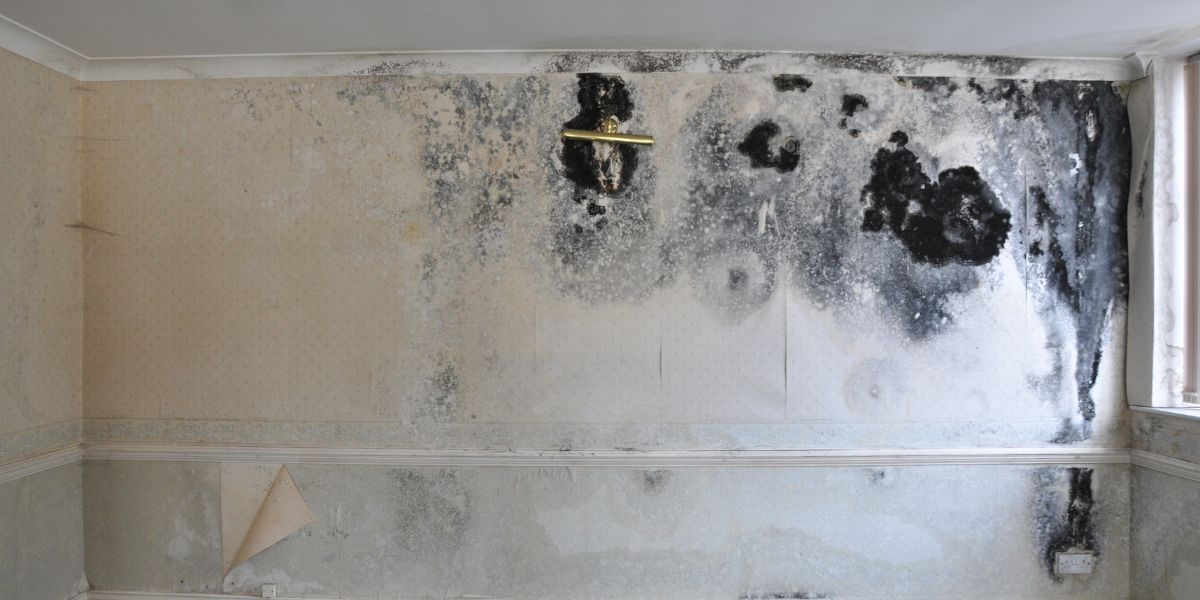
What Factors Contribute to Mould Growth in Brisbane?
The Causes and Consequences of Mould Growth in Brisbane
Brisbane’s subtropical climate, characterised by high humidity and frequent rainfall, creates an ideal environment for mould to thrive. Mould spores are always present in the air, and when they land on damp surfaces, they quickly grow into colonies. Key factors contributing to mould growth in Brisbane homes include:
How Does High Humidity Contribute to Mould Growth?
Mould flourishes in high humidity, especially in Brisbane’s poorly ventilated-homes. The subtropical climate provides a constant source of moisture, creating the ideal conditions for mould to thrive.
What Role Do Leaks and Water Damage Play in Mould Growth?
Brisbane’s frequent heavy rainfall can lead to roof leaks, plumbing issues, and floods. These introduce excess moisture into homes, providing the perfect environment for mould to flourish. Swiftly addressing leaks is essential to prevent mould growth.
How Does Poor Ventilation Impact Mould Growth?
Inadequate ventilation traps moisture indoors, promoting mould growth in bathrooms and kitchens. Given Brisbane’s high humidity, maintaining proper ventilation can be challenging, necessitating additional preventive measures.
Why Opt for Professional Mould Removal Services in Brisbane?
The Importance of Professional Mould Removal Services
Mould is a formidable adversary best left to experts. Here’s why professional mould removal services are crucial:
Why Is Expertise Essential in Mould Removal?
Experts like mould removal Brisbane are trained to identify the type of mould and its source. Different mould types require specific removal methods, ensuring a safe and effective removal process.
How Does Professional Mould Removal Ensure Safety?
Mould removal procedures can release spores and mycotoxins that can harm your health. Professionals employ proper safety gear to minimise these risks, ensuring a safe process for everyone involved.
Why Is Preventive Maintenance Important?
Preventive measures are crucial in mould removal. Professionals not only eradicate existing mould but also address the root cause of its growth. This involves fixing leaks, improving ventilation, and recommending preventive actions to ensure mould doesn’t return.
